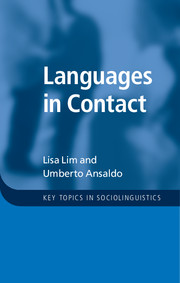Book contents
- Frontmatter
- Contents
- List of figures
- List of tables
- Preface
- Acknowledgements
- List of abbreviations
- 1 Perspectives on contact
- 2 Contact and code choice
- 3 Contact and creole formation
- 4 Contact and language evolution
- 5 Contact and ecology
- 6 Contact and shift
- 7 Contact and globalisation
- 8 Reflections and future directions
- References
- Index
7 - Contact and globalisation
Published online by Cambridge University Press: 05 November 2015
- Frontmatter
- Contents
- List of figures
- List of tables
- Preface
- Acknowledgements
- List of abbreviations
- 1 Perspectives on contact
- 2 Contact and code choice
- 3 Contact and creole formation
- 4 Contact and language evolution
- 5 Contact and ecology
- 6 Contact and shift
- 7 Contact and globalisation
- 8 Reflections and future directions
- References
- Index
Summary
INTRODUCTION
Globalisation – the process by which regional economies, societies and cultures have become integrated through a global network of trade, communication, immigration and transportation – has, as a word, existed since the 1960s. While in the more recent past globalisation was often primarily focused on the economic side of the world, and was the term initially widely used by economists and other social scientists, it now encompasses a broader range of areas and activities, including culture, media, technology, sociocultural, political and even biological factors, such as climate change. The term achieved such widespread use in the mainstream press by the late 1980s that, in the new millennium, many ask if ‘globalisation’ has become a global cliché (Lechner and Boli 2004). Nonetheless, even the more critical of observers accept that the processes associated with globalisation, while not new in substance, are certainly new in intensity, scope and scale (Coupland 2010a). And, even if linguists have been ‘late getting to the party’, as noted by Nikolas Coupland (2003), one of the earlier scholars in language and globalisation, research in the field has certainly burgeoned (see e.g. Coupland 2010b).
Several phenomena associated with the globalised era have been identified by scholars, mentioned in Chapter 1 and reiterated here (from Coupland 2010a: 2–3, excerpted, reordered and numbered here):
i. the decline of the (British) Establishment;
ii. national boundaries becoming (perhaps until recently) more permeable;
iii. massively increasing demographic mobility, often for economic reasons;
iv. developing ethnic pluralism, especially in urban settings;
v. the proliferation and speeding up of communication technologies;
vi. the growth of the middle class but the accentuation of the rich/poor divide;
vii. an upsurge in consumer culture and many new forms of commodification;
viii. greater subservience to global market economics, in the face of its demerits;
ix. a large shift to service-sector work, globally dispersed.
Each of the above has implications for bringing communities and their languages into contact with each other in new, contemporary contexts which, to echo Coupland, are contexts that are distinct from those of the past in terms of intensity, scope and scale.
- Type
- Chapter
- Information
- Languages in Contact , pp. 159 - 186Publisher: Cambridge University PressPrint publication year: 2015

